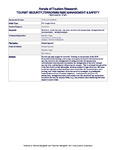Tourist security, terrorism risk management and tourist safety
| dc.contributor.author | Agarwal, Sheela | |
| dc.contributor.author | Page, S | |
| dc.contributor.author | Mawby, R | |
| dc.date.accessioned | 2021-04-16T12:40:12Z | |
| dc.date.issued | 2021-07-01 | |
| dc.identifier.issn | 0160-7383 | |
| dc.identifier.issn | 1873-7722 | |
| dc.identifier.other | 103207 | |
| dc.identifier.uri | http://hdl.handle.net/10026.1/17051 | |
| dc.description.abstract |
Tourists are easy targets for terrorists. Drawing on the example of the 2015 Sousse(Tunisia) shootings, and using a conceptual framework informed by tourist security, terrorism risk management including terrorism risk assessment, communication and due care, we analyse the management of the terror induced security risks, and the factors influencing this process. This is achieved through a firstin-the field tourism study that applies narrative analysis to legal discourse. We show tourist security was compromised by a lack of terrorism risk communication, poor policing, and limited integration of counter-terrorism strategies (e.g.inadequate implementation of environmental mitigation). Implications for terrorism risk assessment, management and communication are discussed and key propositions around tourist security responsibilities (e.g. due care) are examined alongside future research opportunities. | |
| dc.format.extent | 103207-103207 | |
| dc.language | en | |
| dc.language.iso | en | |
| dc.publisher | Elsevier Masson | |
| dc.subject | Terrorism | |
| dc.subject | Tourist security | |
| dc.subject | Due care | |
| dc.subject | Terrorism risk assessment, management and communication | |
| dc.subject | Narrative analysis | |
| dc.title | Tourist security, terrorism risk management and tourist safety | |
| dc.type | journal-article | |
| dc.type | Journal Article | |
| plymouth.author-url | https://www.webofscience.com/api/gateway?GWVersion=2&SrcApp=PARTNER_APP&SrcAuth=LinksAMR&KeyUT=WOS:000675475000023&DestLinkType=FullRecord&DestApp=ALL_WOS&UsrCustomerID=11bb513d99f797142bcfeffcc58ea008 | |
| plymouth.volume | 89 | |
| plymouth.publication-status | Published | |
| plymouth.journal | Annals of Tourism Research | |
| dc.identifier.doi | 10.1016/j.annals.2021.103207 | |
| plymouth.organisational-group | /Plymouth | |
| plymouth.organisational-group | /Plymouth/Faculty of Arts, Humanities and Business | |
| plymouth.organisational-group | /Plymouth/Faculty of Arts, Humanities and Business/Plymouth Business School | |
| plymouth.organisational-group | /Plymouth/REF 2021 Researchers by UoA | |
| plymouth.organisational-group | /Plymouth/REF 2021 Researchers by UoA/UoA17 Business and Management Studies | |
| plymouth.organisational-group | /Plymouth/Research Groups | |
| plymouth.organisational-group | /Plymouth/Research Groups/Plymouth Institute of Health and Care Research (PIHR) | |
| plymouth.organisational-group | /Plymouth/Users by role | |
| plymouth.organisational-group | /Plymouth/Users by role/Academics | |
| dcterms.dateAccepted | 2021-04-02 | |
| dc.rights.embargodate | 2023-4-16 | |
| dc.identifier.eissn | 1873-7722 | |
| dc.rights.embargoperiod | Not known | |
| rioxxterms.versionofrecord | 10.1016/j.annals.2021.103207 | |
| rioxxterms.licenseref.uri | http://www.rioxx.net/licenses/all-rights-reserved | |
| rioxxterms.licenseref.startdate | 2021-07-01 | |
| rioxxterms.type | Journal Article/Review |


